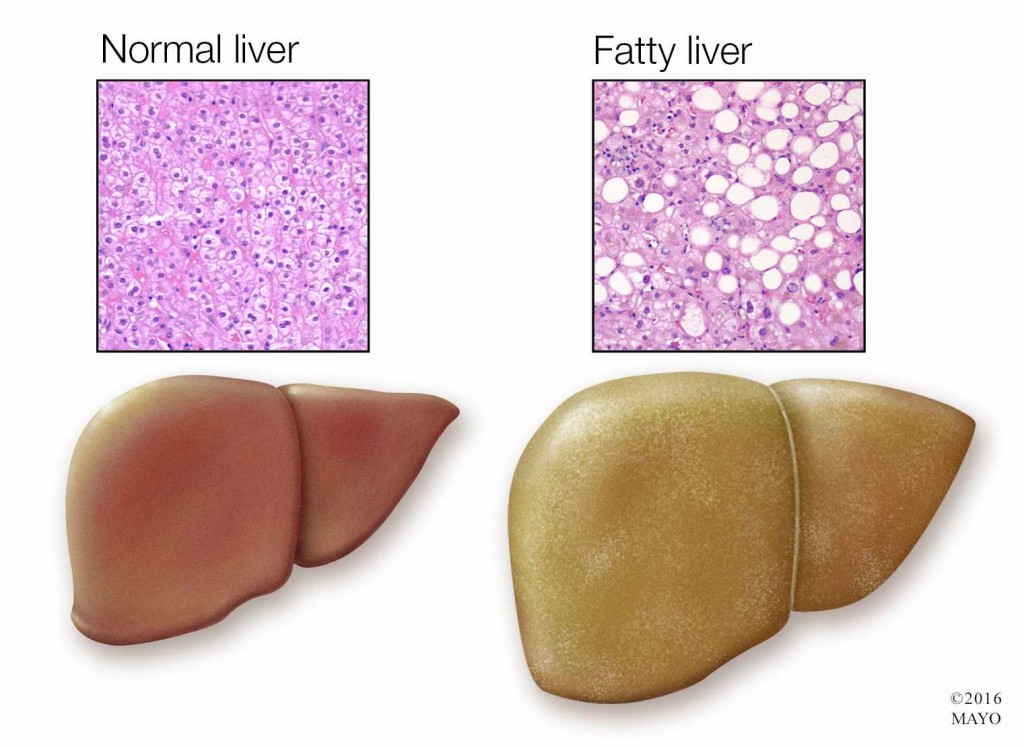-
Featured News
Mayo Clinic Q and A: Weight Loss is Key to Combatting Nonalcoholic Fatty Liver Disease
DEAR MAYO CLINIC: I was diagnosed with nonalcoholic fatty liver disease nine months ago. My doctor told me I need to lose at least 60 pounds to help with inflammation. I have tried to lose weight in the past, but nothing I do seems to work. Should I consider weight-loss surgery, or are there other ways to treat this disease?
ANSWER: The most successful treatment for nonalcoholic fatty liver disease usually includes weight loss. Controlling high blood pressure, diabetes and high triglycerides — a type of fat in the blood — also can help manage this disease. As you develop a weight-loss plan, work with your doctor and other health care providers, such as a dietitian and an endocrinologist, to help you create an approach that’s best for you.
Nonalcoholic fatty liver disease develops when fat builds up in the liver of people who drink little or no alcohol. It’s the most common liver disease in the western world. According to current estimates, between 75 and 100 million adults in the U.S. have this disorder. In most people, nonalcoholic fatty liver disease progresses very slowly. It usually doesn’t cause any symptoms and results of liver tests are normal. The disease often is found on imaging exams, such as CTs or MRIs, that are being done for another reason.
In some cases, nonalcoholic fatty liver disease eventually can damage the liver to the point that cirrhosis develops. This serious and sometimes life-threatening condition involves extensive scarring of the liver. Cirrhosis can make it difficult for the liver to work properly and may lead to liver failure.
In some people with nonalcoholic fatty liver disease, the disorder can manifest as a more aggressive form of liver disease called nonalcoholic steatohepatitis (NASH), which causes liver inflammation and scarring. In some patients with NASH the liver tests are abnormal, but they can remain normal in a significant proportion of affected patients, despite the presence of liver damage. If your doctor is concerned about inflammation in your liver, your condition likely has progressed to NASH. If so, this condition puts you at higher risk for liver cancer and for faster development of cirrhosis.
The best way to combat this liver disease for most people is with weight loss, because it can help reduce liver fat, inflammation and scarring. Typically, weight loss of at least 3 to 5 percent of body weight is necessary for fat to start disappearing from the liver cells. A greater weight loss of 10 percent is needed to improve inflammation and scarring.
Weight loss is best achieved with a combination of a low-calorie diet and increased physical activity. Your health care team can work with you to craft a weight-loss program that fits your needs. If you are obese or have medical problems that are related to obesity, your care team may recommend weight-loss, or bariatric, surgery.
For those who do not qualify for bariatric surgery or who are not ready to commit to a surgical procedure, new endoscopic techniques to assist with weight loss may be another option. One of these procedures involves placement of a balloon in the stomach to help decrease the amount of food you can eat and limit your calorie intake. The balloon is removed after six months. Although this is not an established treatment method for nonalcoholic fatty liver disease or NASH, it may be an effective way to jump-start your weight loss. Once the balloon is removed, you need to maintain a healthy lifestyle to keep from gaining the weight back.
If you are not already doing so, consider working with a physician who specializes in liver disease to monitor your condition. He or she can help you review the treatment possibilities that are right for your situation, as well as assess your liver disease regularly over time to watch for any disease progression or other complications. — Dr. Alina Allen, Gastroenterology and Hepatology, Mayo Clinic, Rochester, Minnesota








